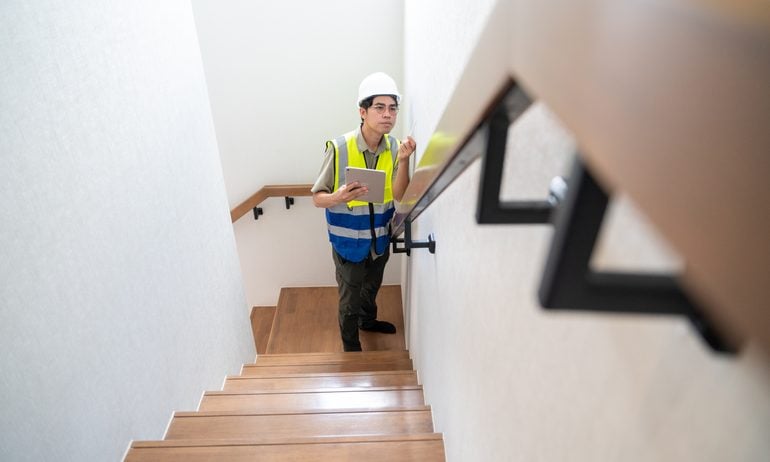How to Prepare for a Home Insurance Inspection
You might need an inspection before your insurance company will cover your home.

Many, or all, of the products featured on this page are from our advertising partners who compensate us when you take certain actions on our website or click to take an action on their website. However, this does not influence our evaluations. Our opinions are our own. Here is a list of our partners and here's how we make money.
Your insurer may request a home inspection to assess your property’s risk and cost to rebuild.
The inspector will typically look at the outside of your home and may also check interior systems like electricity and plumbing.
A home insurance inspection may be more likely if your home is old or located in a high-risk area.
Depending on the results of the inspection, you could pay more or less for insurance, or even be denied coverage.
Before you buy a homeowners policy, your insurer might require a home insurance inspection. This inspection isn’t the same as the one you had when you bought your house. Instead, it’s a way for insurance companies to see the condition of your home, evaluate your coverage needs and decide whether they’re willing to insure you. Keeping your home in good shape can help this process go smoothly and ensure you get the coverage you need.
What is a home insurance inspection?
A home insurance inspection helps insurers understand the risks of covering your house. It allows your insurer to figure out how much it would cost to rebuild your house and to spot any issues, like fire hazards or weak structures, that might lead to insurance claims in the future. This information helps the insurance company decide if your home is in good enough shape to insure, and if so, how much your premium should cost.
Not all homes will undergo these inspections. Your insurer might require an inspection if:
You have a high-value or older home.
You live in an area at risk of tornadoes, hurricanes, wildfires or other hazards.
The company needs more information to set the replacement cost value of your house.
What can you expect during a home insurance inspection?
You might not need to be present for an exterior inspection, but you will if the inspector is checking the interior of your home for things like wiring, plumbing and safety features. The inspection could take up to a few hours, depending on how detailed it is.
For an external inspection, the inspector may look at things like your roof, windows, doors and chimney. They may also check for hazards like overhanging trees or cracks in the walkways.
An interior inspection may involve examining walls, ceilings and floors for signs of water damage or pests. The inspector may also assess the state of your plumbing, electrical, and heating and cooling systems. They’ll often check safety features like smoke detectors, carbon monoxide detectors and security systems, too.
Your insurer may use your home insurance inspection to verify that you qualify for certain home insurance discounts. For example, many companies offer savings for having a home security system.
How to prepare for a home insurance inspection
Before your home insurance inspection, do your own thorough check to avoid being caught off guard by any problems. (You may want to hire a professional for some of these tasks.)
If you spot any potential issues, fix what you can or reach out to a contractor who can help. Here are a few key places to focus on.
Exterior of the house
Roof: Have a roofer check for damaged or missing shingles.
Gutters: Clear debris and ensure your gutters are secure.
Chimney: Look for cracks or loose bricks; consider a professional cleaning.
Trees: Trim branches away from the house.
Siding, doors and windows: Check for cracks, leaks and damage.
Walkways: Ensure there are no tripping hazards.
Yard: Remove loose debris and get rid of pools of water near your home that could lead to pests.
Interior of the house
Detectors: Ensure smoke and carbon monoxide detectors work.
Fire extinguisher: Check to make sure it’s operational.
Fireplace: Clean it out if you have one.
Windows, walls, doors and plumbing: Check for signs of leaks, cracks and pest issues.
Attic and basement: Look for signs of water or pest damage.
HVAC system: Have a professional clean and test your system.
What if you fail a home insurance inspection?
If your home doesn't pass the insurance inspection, don’t worry — you have options. Make sure to act quickly. Being uninsured, even for a short time, is risky. A lapse in coverage can make it harder and more expensive to get a policy in the future. And if something happens while you’re not insured, you’ll be financially responsible.
Fix the issues
Your inspector may point out problems like a leaky roof or electrical issues. If your insurance company denies you coverage for fixable reasons like these, address them if you can.
Find a different insurer
If you were denied coverage because you live in an area at high risk for crime or severe weather, ask your neighbors who they use for home insurance. You can also ask the previous homeowners or reach out to a local independent insurance agent.
Not all companies have the same rules. Some insurers are pickier than others about the age of your roof, for instance. So if you can't afford to get a new roof or make other major repairs, try another company. If one insurer says no, another might say yes.
Dispute the decision
If your insurer drops you due to a failed home insurance inspection and you don’t agree with the decision, you can dispute it. Be prepared to provide evidence to support your case, such as receipts for work you’ve had done on the house or a property assessment from an independent inspector.
You can also file a complaint with your state’s insurance department. It can conduct its own research into your claim and work with your insurance company to resolve the issue.
Look into state-run insurers
Many states have programs to help homeowners who struggle to get insurance. For example, Fair Access to Insurance Requirements (FAIR) plans are designed for high-risk homes that private companies won’t insure. An independent insurance agent can help you find programs like this in your area.





